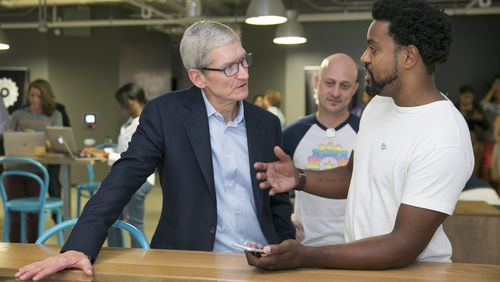In September, Amazon set off one of the biggest bidding wars among states in memory for its second headquarters project, and Apple appears to be gearing up for a sequel, with Georgia a possible contender.
Apple said Wednesday that it is planning to build another corporate campus and hire 20,000 workers during the next five years as part of a $350 billion commitment the tech company said it will make to the U.S. that will be partially financed by an upcoming windfall from the country’s new tax law.
Apple’s planned domestic investment plan immediately got the attention of economic development officials across the country.
In broad strokes, Apple’s plans include investments in its U.S. manufacturing network and supply chain, new data centers and a future “campus” that the maker of iPhones and Macintosh computers said it will announce later this year.
That means the investments could be sprinkled across the country, and not in solely one location like Amazon's 50,000-job "HQ2."
“It sounds like it is multifaceted. It’s not just one thing,” said Craig Lesser, a former commissioner of economic development for the state of Georgia, who is now an economic development strategist with Pendleton Group.
The Atlanta area would undoubtedly position itself to be a contender for a major Apple corporate campus or technology-job expansion, touting the region’s relatively low cost of living, growing tech workforce and research universities such as Georgia Tech.
In recent years, the Atlanta area won numerous regional headquarters, innovation centers and software development centers. Much of that growth has centered in Midtown near Georgia Tech.
Like Amazon’s HQ2 search, Apple’s expansion plans likely will be closely watched and fiercely fought for by rival states.
“This is another iconic company with big plans that’s proven to be successful,” Lesser said. “Who wouldn’t want some part of this investment in their community?”
In recent years, Apple developed a new spaceship-like headquarters in Cupertino, Calif., and a major operations center in Austin, Texas.
The future campus, which Apple provided little by way of details, would “initially house technical support for customers,” Apple said.
Apple’s multibillion-dollar pledge came less than a month after Congress approved a sweeping overhaul of the U.S. tax code championed by President Donald Trump that will increase corporate profits.
Besides dramatically lowering the standard corporate tax rate, the reforms offer a one-time break on cash being held overseas.
Apple plans to take advantage of that provision to bring back most of its roughly $252 billion in offshore cash, generating a tax bill of about $38 billion. It’s something that Apple CEO Tim Cook promised the company would do if it could avoid being taxed at the 35 percent rate that had been in effect under the previous tax law.
About $75 billion of the $350 billion in U.S. investments will be paid from money that had been overseas, Apple estimated.
The Associated Press contributed to this report.
About the Author







